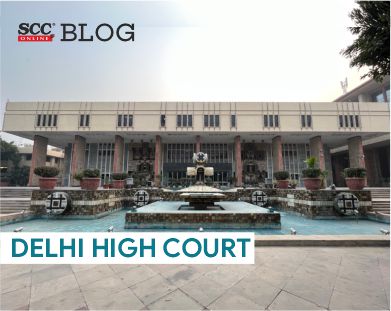Delhi High Court: A Division Bench of V. Kameswar Rao and Anoop Kumar Mendiratta, JJ. held that the engagement of BSNL VRS-2019 retirees in any Central Public Sector Enterprises/Government department on contractual/consultancy basis, for which the retired employees on superannuation in due course were eligible for consideration, was not in violation of Clause 8 (iii) of BSNL Voluntary Retirement Scheme-2019 and therefore, the petitioners were eligible to be considered for appointment on consultancy/contractual basis.
Background
The petitioners were the retired employees from Bharat Sanchar Nigam Limited (BSNL), who opted for Voluntary Retirement Scheme (VRS), 2019 proposed by BSNL as approved by the Government of India and as per the petitioners, the VRS retirees were to be treated at par with the retirees after superannuation for all purposes. The respondents published a notification inviting applications from retired eligible employees for engagement as consultant at LSA, Haryana Zone and petitioners were engaged as consultants by the respondent, but the contract of the petitioners was terminated.
The petitioners were further aggrieved by the action of Department of Telecommunication (DOT), Ministry of Communications regarding engagement of consultants in DOT Engineering Centre on short term basis, which expressly barred the BSNL/VRS retirees from being considered for engagement as consultants from amongst the eligible candidates retired from Central/State Government servants.
Submissions on behalf of the Petitioners
The petitioners submitted that the notification debarring the VRS retirees of BSNL VRS-2019 was in violation of fundamental rights guaranteed under Article 14 and 16 of the Constitution of India as the petitioners were eligible and qualified for being engaged as consultants at par with the other retired employees.
Submissions on behalf of the Respondent
The respondent submitted that there was no distinction between “employment” and “re-employment” in DPE Guidelines and engagement in a Central Public Sector Enterprises (CPSE) /government on contractual/consultancy basis would also qualify as re-employment/employment under the Department of Public Enterprises (DPE) guidelines. Consequently, the DPE guidelines prohibited VRS retirees from employment in another CPSE including consultancy/contractual engagement. The petitioners were already paid up to 125% of the last drawn salary in terms of the VRS Scheme. Further, even in case of engagement on contractual/consultancy basis in a CPSE or government, the employee gets salary from the CPSE/government and hence, the engagement attracts the bar under VRS BSNL-2019 scheme as well as DPE guidelines.
Analysis, Law, and Decision
The issue for consideration was “whether the engagement of VRS retirees of BSNL VRS-2019 as consultants on purely short terms basis from amongst the retired Central/State Government servants and retired officials of BSNL would amount to “re-employment” as referred to in Clause 8(iii) of the VRS? Consequently, if the retirees of BSNL VRS-2019 could be debarred from being considered for such engagement on contractual/consultancy basis.”.
The Court noted that BSNL VRS was one of the initiatives undertaken to strengthen BSNL to make it viable in which attractive VRS was offered to all the willing employees of BSNL, who were more than 50 years of age. A letter was issued by the Director to the employees to allay the doubts raised by some quarters that employees who undertook VRS would be treated as a separate group and would be treated distinctly. It was therein clarified that BSNL employees retiring on VRS-2019 was neither a distinct nor a separate group but would be at par with retirement on superannuation. The Court further noted that “Clause 8(iii) of BSNI VRS-2019 reflected that the only restraint which was envisaged under the VRS-2019 was that the employees who retired under this Scheme, would not be eligible for re-employment in any other CPSE. In the eventuality, the employee who still desired to take up re-employment in any CPSE, such employee was required to refund the entire amount of ex-gratia received under the Scheme to BSNL”.
The Court opined that the petitioners by accepting the BSNL VRS-2019, could not be deemed to have waived or surrendered or abrogated their rights as available to any other BSNL employee on normal superannuation except to the extent specified in VRS and expectation of employment on contractual/consultancy basis by the VRS retirees and for being treated at par with the employees who superannuate on reaching the age of retirement, appeared to be a legitimate expectation.
The Court held that “a distinction appeared to be incorrectly carved out by the respondent by debarring such VRS retirees from being engaged on contractual/consultancy basis vis-a-vis employees superannuating in routine course from BSNL/DOT was in violation of Articles 14 and 16 of the Constitution of India”. The Court further estopped the respondent from unilaterally changing the terms of VRS-2019 against the express assurance given by the BSNL to the employees at the time of introducing the VRS.
The Court held that any guidelines/notification issued by the Competent Authority after the VRS Scheme-2019 was finalized and accepted, could not restrict the rights of the employees who opted for BSNL VRS-2019 beyond Clause 8 (iii) of the VRS Scheme which only provided the restriction regarding “re-employment” in any other CPSE. Further, it was held that the engagement of BSNL VRS-2019 retirees in any Central Public Sector Enterprises/Government department on contractual/consultancy basis, for which the retired employees on superannuation in due course were eligible for consideration, was not in violation of Clause 8 (iii) of BSNL Voluntary Retirement Scheme-2019 and therefore, the petitioners were eligible to be considered for appointment on consultancy/contractual basis.
[Ashwani Kumar Sharma v. Union of India, 2023 SCC OnLine Del 132, decided on 12-1-2023]
Advocates who appeared in this case :
For the Petitioners: Advocate Atul Chaubey
For the Respondent: Senior Panel Counsel Jivesh Kumar Tiwari
Advocate Mimansak Bhardwaj
Advocate Sunny
*Simranjeet Kaur, Editorial Assistant has reported this brief







